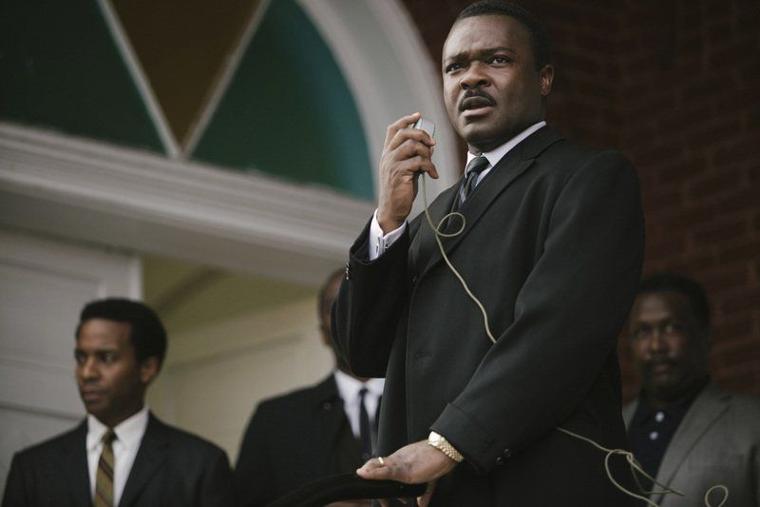
As a Martin Luther King biopic, the film does his character justice. We immediately get a sense of Dr. King's elocutionary prowess at the beginning of the film as he rehearses the opening lines of his Nobel acceptance speech. Even before we see him, we hear his voice speaking light into darkness the way it did for so many African Americans during the civil rights movement. His humility does not escape us either, as he laments that it is "not right" how he looks like he's "living high on the hog dressed like this" while "folks back home" are suffering. In sharp contrast to President Johnson, who insisted that "this voting thing's just gonna have to wait," Dr. King persists in his determination to "build the path
rock by rock" through civil disobedience. There is palpable hope among his allies for such an endeavour. For example, when Coretta King worries that she didn't have enough time to "prepare" prior to meeting Malcolm X, Amelia Boynton (leader of the American Civil Rights Movement in Selma), says to her: "We are the descendants of a mighty people [...] They've prepared you. You are already prepared."
The film is carried by its cast, most notably the astonishing David Oyelowo. He sustains a regal poise throughout the film, one that is most evident when Dr. King turns his supporters around at the start of the second planned march to Montgomery, deciding to forgo bloodshed. Through Oyelowo's performance, we are closer to vicariously experiencing the stunning impact that Dr. King's speeches hand (and have) on people. Oprah Winfrey, although only in the film for brief scenes, delivered the second-best performance in the film.
But the true star of the film is its director. Ava DuVernay has a fine sense of timing and acute grasp of visual detail. A great touch is the inclusion of "F.B.I notes" to show how J. Edgar and his team routinely logged Dr. King's activity. Scenes with these notes are shot from a distance to give us some perspective. DuVernay also shocks us effectively (very effectively) with the explosion in the opening of the film, but not at the expense of elegance. Indeed, she captures grace in violence through the slow-motion aftermath that follows: young girls float through debris as if they were weightless ballerinas. Such technique is echoed later on in the most striking scene of the film, as men on horses charge and whip protestors during their first march to Montgomery. Music beats in the background as people, running for their lives through cloud, are chased and terrorized. DuVernay knows how to run an action scene. The tensest and most heartbreaking of these is that of Jimmie Lee Jackson's death. (That was the first instance where I cried when watching the film; the second was, of course, the ending.)
In some ways, Selma does not have the sense of novelty that it would need to beat out its opponents for the Best Picture race. Moreover, because the writers trimmed the scope of the film's depiction of Dr. King, it does not cover the entirety of his legacy. Whereas The Grand Budapest Hotel is driven by its plot and Birdman by its cinematography, Selma - more limited in plot and empowered mostly by its actors - is at a disadvantage. Yet Selma is timeless. As Common raps in what is a sure-win at this year's Oscars for Best Original Song, "Resistance is us ... That's why we walk through Ferguson with our hands up." The path to equality still extends before us; I hope that many remain with the tenacity to build that path "rock by rock."
